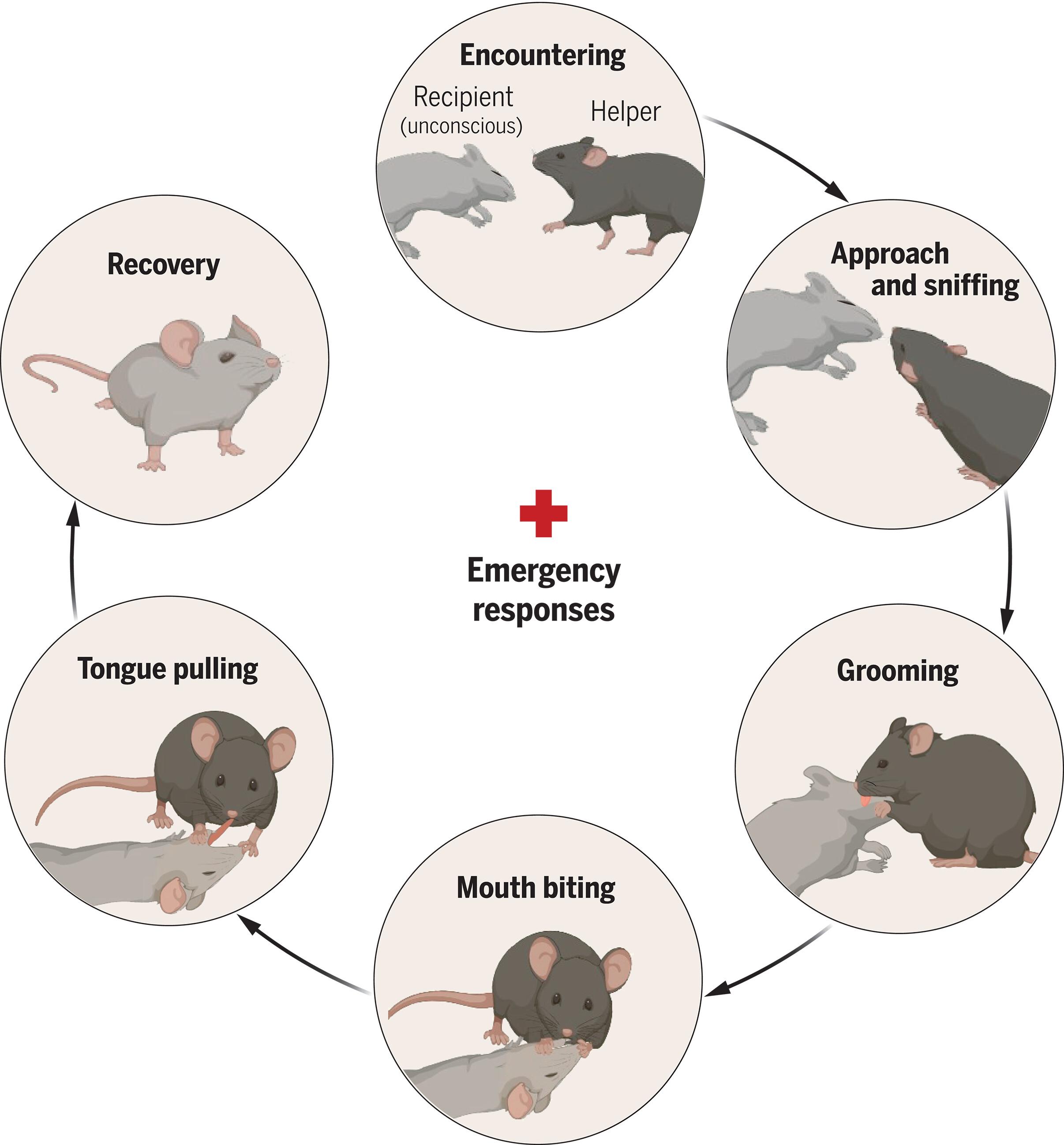啮齿类动物对无意识或死亡同种动物的恢复式亲社会行为
IF 45.8
1区 综合性期刊
Q1 MULTIDISCIPLINARY SCIENCES
Science
Pub Date : 2025-02-21
引用次数: 0
摘要
尽管人类表现出紧急反应来帮助无意识的个体,但非人类动物对无反应的同种动物的反应却不太清楚。我们报告说,老鼠对无意识或死亡的社会伙伴表现出刻板的行为,从嗅闻和梳理到更有力的行为,如咬嘴或咬舌头和拉舌头。后一种强烈的行为,在熟悉的伴侣中更为突出,开始于长时间的不动和不反应,并在伴侣恢复活动时停止。他们的结果,包括改善气道开放和清除,加速从昏迷中恢复,表明类似于救援的努力。下丘脑室旁核中的催产素神经元对无意识伴侣和活跃伴侣的反应不同,它们的激活以及催产素信号是恢复行为所必需的。这种帮助反应迟钝的成员的倾向可以增强群体凝聚力和社会物种的生存。本文章由计算机程序翻译,如有差异,请以英文原文为准。

Reviving-like prosocial behavior in response to unconscious or dead conspecifics in rodents
Whereas humans exhibit emergency responses to assist unconscious individuals, how nonhuman animals react to unresponsive conspecifics is less well understood. We report that mice exhibit stereotypic behaviors toward unconscious or dead social partners, which escalate from sniffing and grooming to more forceful actions such as mouth or tongue biting and tongue pulling. The latter intense actions, more prominent in familiar pairs, begin after prolonged immobility and unresponsiveness and cease when the partner regains activity. Their consequences, including improved airway opening and clearance and accelerated recovery from unconsciousness, suggest rescue-like efforts. Oxytocin neurons in the hypothalamic paraventricular nucleus respond differentially to the presence of unconscious versus active partners, and their activation, along with oxytocin signaling, is required for the reviving-like actions. This tendency to assist unresponsive members may enhance group cohesion and survival of social species.
求助全文
通过发布文献求助,成功后即可免费获取论文全文。
去求助
来源期刊

Science
综合性期刊-综合性期刊
CiteScore
61.10
自引率
0.90%
发文量
0
审稿时长
2.1 months
期刊介绍:
Science is a leading outlet for scientific news, commentary, and cutting-edge research. Through its print and online incarnations, Science reaches an estimated worldwide readership of more than one million. Science’s authorship is global too, and its articles consistently rank among the world's most cited research.
Science serves as a forum for discussion of important issues related to the advancement of science by publishing material on which a consensus has been reached as well as including the presentation of minority or conflicting points of view. Accordingly, all articles published in Science—including editorials, news and comment, and book reviews—are signed and reflect the individual views of the authors and not official points of view adopted by AAAS or the institutions with which the authors are affiliated.
Science seeks to publish those papers that are most influential in their fields or across fields and that will significantly advance scientific understanding. Selected papers should present novel and broadly important data, syntheses, or concepts. They should merit recognition by the wider scientific community and general public provided by publication in Science, beyond that provided by specialty journals. Science welcomes submissions from all fields of science and from any source. The editors are committed to the prompt evaluation and publication of submitted papers while upholding high standards that support reproducibility of published research. Science is published weekly; selected papers are published online ahead of print.
 求助内容:
求助内容: 应助结果提醒方式:
应助结果提醒方式:


